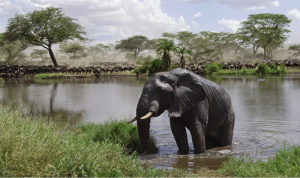Elephant poaching and how it’s erasing the African giants

If you have ever had the chance before to feed an elephant, and rubbing the soft skin under their mouth, while they take the food out of your hands with their trunks, then you too will have a special connection with these gentle giants of Africa. They are sadly being poached for their ivory tusks. If the rate of hunting them down and slaughtering them for their tusks goes on, then soon there will be no more elephants left.
The habitats of elephants are being eroded by humans seeking more land to feed their own. The impact is that farming land is increasing and the forests where the elephants live are being lost.
The result is that many elephants are coming in contact with humans. The elephants raid the farm lands and the farmers kill them in reprisal. But this is not the worse that happened to these African giants. Poaching still remains the elephant’s biggest threat.
Even though there is a ban on international trade on ivory, there is a growing demand for ivory from the Far East, especially China. There the ivory is used to made ornaments and jewelry. But since the ban in the 1980s some elephants did recover, but in the past 10 years, the numbers of both forest and savannah elephants have dropped dramatically.
Factors that have let to this dramatic decline, can be contributed to civil war in many African countries, a weak law enforcement, national parks that are not properly funded, and corruption that undermine efforts to halt the poaching.
The biggest population of elephants in Africa can be found in Southern Africa (around 70%), followed by Eastern Africa (with around 20%), and Central Africa (about 6%) and West Africa (less than 3%). Eastern Africa is the worst affected area by poaching. A drop of about 50% of the population has occurred. The nuclear center of this devastation is Tanzania. There around 60% of its elephant populations have been lost. In Central Africa, the forest elephants in the Democratic Republic of Congo, Gabon and Congo have felt extreme loss of elephant’s numbers because of poaching, as well as in Cameroon. There their forest and savannah elephants have also been targeted. The worst areas must be Central African Republic as elephants are almost extinct in this area. In Côte d’Ivoire, Ghana, Guinea Bissau, Sierra Leone, Togo, Guinea and Nigeria, in West Africa, 12 populations have already been lost. Southern Africa, however, the elephant populations are under serious threat of poaching, if not critical.
Some countries have stepped up their anti-poaching efforts, but a record amount of ivory trunks are still being shipped to China. This after poachers hunt the animals down in National Parks and private game reserves. Their trunks butchered out of their flesh. Their corpses left to rot. As the numbers are declining, political will is not increasing, more so, a lack of effort in China to actively stop the demand is not forthcoming.
As being one of the Big 5, which means one of the five animals that can kill you, elephants are a must on a safari. These animals can out run you. They have a remarkable memory and will remember you for the rest of their lives. And a mother will protect her calf with your life. But since experiencing these giant creatures in the wild are under threat, there is a great concern that you will not be able to enjoy that gift in the future. For that reason many people are coming to Africa to view these animals while they are still around. If you’d like to prepare for this extraordinary experience while it is still possible to enjoy it, be sure to read the complete safari guide for Tanzania where you will really learn to appreciate the vastness of this African ecosystem.
It will be sad if all that is left of these gentle animals are mere safari photos taken by tourists.
Still there is hope. For each tourist that enters a National Park it means employment is created, and some of the funds that are collected can be pushed back into the park’s protection. Counties such as Tanzania, however, needs to improve their park management to make sure parks like the Serengeti National Park remains a safe haven for elephants.
Meanwhile with the true threat of extinction hanging over the elephant species in Africa, as the speed of poaching does not seem to ease up, viewing them in their natural habitat is a real humbling and special memory that will last you your lifetime. Seeing these special animals in habitation camps are not the answer. You want to see them roam in herds in the wild. But still, having any contact with one of them is better than having no elephants left in Africa.

